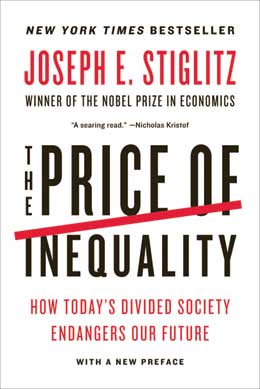
Photo courtsey of Tamra Talmadge-Anderson, cc by-cc
When many of us consider how to increase community investment in the name of rectifying social inequality, we instinctively talk about expanding federal programs like community development financial institutions and New Markets Tax Credits. But compared with a national economy with total assets of about $150 trillion, these anti-poverty programs — two decades of federal investment totaling about $40 billion — seem almost laughably small. A far better target, one we ignore at our peril, is to focus on the obvious: Moving the average American’s investment portfolio from Wall Street to Main Street.
There’s overwhelming evidence that locally owned businesses, nearly all of which are small (fewer than 100 employees) or medium-scale (100-500 employees), contribute significantly more to economic and community development than do their large-scale, publicly traded counterparts. More than a dozen studies done by the Austin-based research firm Civic Economics, for example, have shown that because local businesses spend more of their money locally and because they are relatively immobile, they are more reliable generators of “economic multiplier” benefits like income, wealth, jobs, and tax revenue.
A less appreciated but equally important benefit of local businesses is greater social equality. In a 2010 article in the Harvard Business Review titled “More Small Firms Means More Jobs,” the authors write, “Our research shows that regional economic growth is highly correlated with the presence of many small, entrepreneurial employers — not a few big ones.” Another paper just published by the Federal Reserve in Atlanta performed a regression analysis of all counties in the United States, and found statistically significant evidence that “local entrepreneurship matters for local economic performance. … The percent of employment provided by resident, or locally-owned, business establishments has a significant positive effect on county income and employment growth and a significant and negative effect on poverty in all the counties and non-metro counties sampled.”
Broadly speaking, greater investment in local business is a powerful anti-poverty strategy.
There’s emerging evidence that a smart local investor can achieve a higher rate of return than a smart global investor. U.S. sole proprietorships, which most small businesses are or start out as, are three times as profitable as C-corporations (companies taxed separately from their owners). In Canada recent data suggests that the most profitable scale of business is 10Ð20 employees, with double the profitability of firms traded on the Toronto Stock Exchange.
What’s the Problem?
Despite the potential power of local investing to ameliorate poverty and the potential profitability for its practitioners, very little of mainstream investment touches local business. The reason can be traced back the 1930s, when the United States enacted a series of securities laws that should be called Investor Apartheid. If you’re in the top 1 percent of income earners or wealth holders — a so-called “accredited investor” — you can invest in any business any amount you want, no questions asked. If you’re in the other “unaccredited” 99 percent, you can’t invest a penny unless that business has undertaken significant legal disclosures that easily could cost it $25,000, $50,000, even $100,000. The practical result is that smaller businesses, daunted by the probable legal bills, don’t bother with unaccredited investors.
The undeniable result has been a huge capital market failure. Even though publicly traded companies support less than half the economy and confer the fewest economic-development benefits, they receive nearly all of our long-term investment. That is, well over 99 percent of the $30 trillion of long-term investment that U.S. households make — in stocks, bonds, mutual funds, pension funds, and insurance funds — is in the nonlocal economy. Americans are systematically overinvesting in Fortune 500 Companies and underinvesting in local business. And the vast majority of the readers of Shelterforce are no exception!
If we were to fix this capital market failure, at least half of the $30 trillion of long-term investment would shift to the half of the economy that is local. That would mean a $15 trillion shift into communities’ economies. This is the mother lode of capital for transforming the American economy.
The good news is that this shift has already begun to happen. The Jumpstart Our Businesses (JOBS) Act, signed into law by President Obama in 2012, is about to be implemented. While its impact is unclear, most observers believe that small businesses seeking “crowdfunding” investment on licensed investment “portals” will face legal and accounting costs closer to $5,000Ð$10,000. That’s a great step in the right direction.
What we need next, I believe, is to create a space for community investment that requires no lawyers and costs virtually nothing. Imagine, for example, allowing any American to put up to $100 into any qualified community investment with no lawyers or bureaucracy whatsoever. We could start with social enterprises, coops, and community development corporations serving low-income populations, and then expand this “safe harbor” to all locally owned businesses.
Securities lawyers hate this idea, arguing that it invites fraud. But $100 invested in a community enterprise, I would counter, is no more risky than a dinner for two at a brand new, unvetted restaurant. How often do we require restaurants to spend tens of thousands of dollars on “disclosure” statements before they open their doors? Moreover, even if we abolished all securities laws, investment fraudsters would still be vulnerable to civil suits or criminal prosecution.
The kind of reform I’m suggesting can be initiated at the state level. Securities laws generally leave it to states to regulate “intrastate investing” in local business. We should not only make it cheaper and easier for local businesses to issue securities, but also cheaper and easier for locals to buy and sell their shares on local stock exchanges and to invest in diversified local investment funds.
Now for the best news of all. States are moving forward. Since the JOBS Act was passed, the states of Alabama, Georgia, and Kansas have gone further with their reforms. Exciting legislation is pending in Colorado and Michigan. To end Investor Apartheid and to facilitate the $15 trillion shift, we should encourage a thousand flowers of state-based experimentation to grow.
This kind of strategic shift — from the nickels and dimes of CDFIs to the trillions possible if we sensibly move our money into local business — may well be our best shot at ending poverty in our lifetimes.





Comments